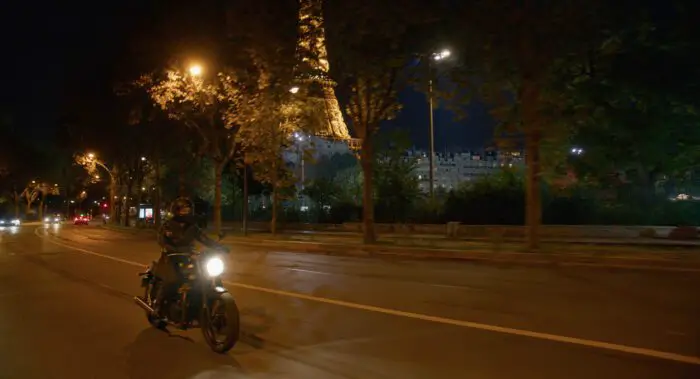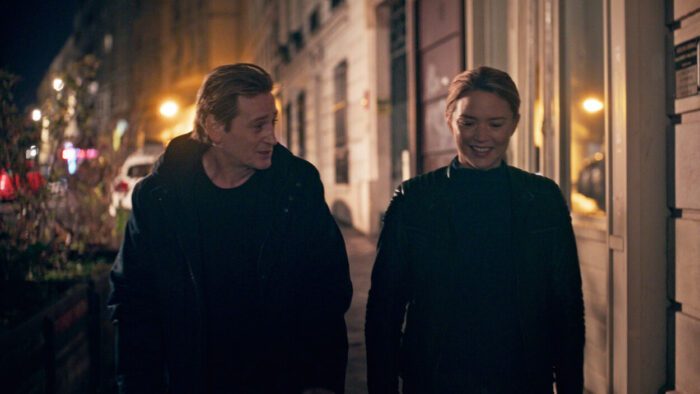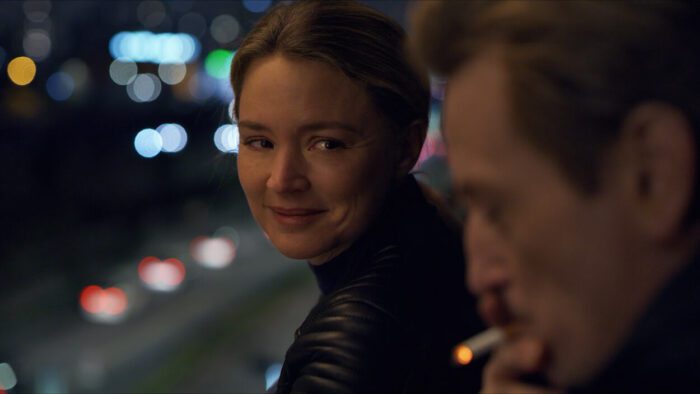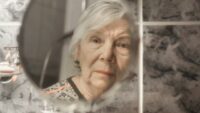As of this writing, there have been to date eight mass shootings this year in France, making it, regrettably, the country with the third highest number of such events in 2023. I’m sure any reader can guess which country is first: the United States of America, with over 100 in some 175 days. In the U.S. gun deaths (including suicides, which account for more than half) have risen to all-time highs, up 23% over the past two years, and guns are today the leading cause of death for U.S. children and teens.
So why address mass shootings and gun deaths in a review of the quiet French drama Revoir Paris? I could not help but think, as watching the film, that we Americans gorge ourselves on a constant stream of big-budget action flicks, never-ending franchise fare, and pop-biopics about media figures. Even our auteurs favor style over substance, and the most-anticipated film of the summer is, I am not kidding, is a film about a popular children’s toy. Meanwhile, Americans stockpile arms at a record pace and our citizens die in the streets. And at malls, theaters, concerts, gatherings of all types.
Few American films have addressed the consequences of gun violence and mass shootings. There was Fran Kanz’s excellent Mass, and before that, Lynne Ramsay’s We Need to Talk about Kevin, the two of them between them doing some $11 million in box office, $10.8 million of that from the latter. It’s not too likely any American film addressing the topic will find a wide viewership, but one would think American filmmakers could address the most pressing issue of the day—and the predominant means by which we bury our young.
Meanwhile, French director Alice Winocour has channeled her own brother’s experience—he survived the 2015 Bataclan concert hall attack that killed 130—into a provocative, too-damn-timely, and ultimately sweet survivor’s tale in Revoir Paris. Starring an excellent Virginie Efira (Other People’s Children) and Benoît Magimel (The Piano Teacher, Pacifiction), the film focuses on the trauma of surviving such an event, if on an apparently smaller scale, in ways that manage to be both insightful and affecting.
Mia (Efira) leads a quietly fulfilling personal and professional life in Paris, enjoying a relationship with her partner Vincent (Grégoire Colin) and her career as a journalist and translator, making her way between appointments in her omnipresent leather jacket on her motorcycle. On one seemingly idyllic date, she and Vincent are interrupted, and, her motorcycle ride home halted by a downpour, Mia takes a brief shelter in a busy Parisian bistro full of local celebrants, where she fastidiously studies her notes. She’s an introvert and an intellectual, her head deep in her workspace.

There, her reverie is shattered by gunfire when a shooter opens fire on the staff and patrons, killing nearly everyone in sight. Mia and perhaps a dozen or so others survive, but many more are felled by the gunman. This—the only violent sequence in the film—is conveyed with a blunt, largely first-person, perspective, the imagery and sound largely confined to the limited sights and sounds Mia perceives until the screen goes black and the scene silent, suggesting her blackout.
Three months later, Mia’s memories are hazy, aggravatingly so, and her preoccupation with the attack becomes consuming. Numbed and unable to resume her prior life, she sees the ghosts of those who died instead of her. Meanwhile, her social circle sees her as something of a celebrity, no longer the Mia they knew but the woman who survived the mass shooting. She’s the woman with a story to tell who can’t and won’t tell it.
Over time, Mia becomes more and more determined to learn just what happened, returning regularly to the bistro and meeting with other survivors. It does not all go well: while she makes connections with both an orphaned teenager, Félicia (Nastya Golubeva) whose parents died in the shooting, and an injured banker, Thomas (Magimel), with whom she begins an unlikely, halting relationship, Mia’s interactions with others are less successful. One woman, riddled with grief, directly (and falsely) accuses Mia of having locked herself in (and others out of) a bathroom to save herself at the expense of others, including the woman’s dead husband.

Then there is the matter of a partial memory: Mia recalls that while she was injured and only partially conscious, a stranger helped her to survive the attack. She resolves to find him, although the fact that the bistro was staffed primarily by undocumented immigrants makes her quest to do so doubly difficult. The network of those who serve and employ the undocumented traffics in fake papers and false identities, and they’re less than trusting when a well-to-do professional white woman starts asking questions.
While one might blanch at a narrative foregrounding a white professional woman’s trauma above all others, especially in response to an event that killed dozens, the script’s intentions seem perfectly genuine and organic. In Mia, Winocour has developed a round, dynamic, and sympathetic character determined to put her life back on track—as she should—and in Efira, she has found a pitch-perfect actor to play the part. Efira, resolute and determined, troubled and conflicted, plays MIa’s emotions close to the vest, but her intelligence and empathy for others shine through at key moments.

Trauma and tragedy can alter lives. Some grieve, others change. Mia forges new connections, finding passions she did not know her prior life lacked. That fact does not suggest a single person’s individual contentedness outweighs the death of dozens or the grief of their loved ones. It’s simply the story Winocour, based on her brother’s experience, can and does tell. And, in doing so, she and Efira make Revoir Paris a moving, affecting meditation on healing from the trauma of the wounds inflicted by a mass shooter.
I wish more filmmakers, especially in the one country more riddled by that plague than any other on earth, would follow suit.
Directed and co-written Alice Winocour (in collaboration with Marcia Romano and Jean-Stéphane Bron), Revoir Paris opens in New York June 23, 2023 and Los Angeles on Friday, June 30, with a national expansion to follow. A Music Box Films release. In French, with English subtitles, 104 minutes.



